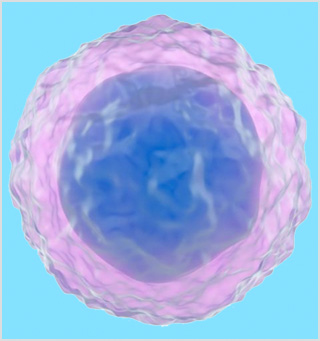Use of Immunotherapeutic Expanded to Follicular Lymphoma
The U.S. Food and Drug Administration (FDA) approval provides a new option for patients with a common type of non-Hodgkin lymphoma.

Use of the immunotherapeutic obinutuzumab (Gazyva) was recently expanded by the U.S. Food and Drug Administration (FDA) to include certain patients with follicular lymphoma, which is the most second-most common form of non-Hodgkin lymphoma diagnosed in the United States.
Obinutuzumab is intended for use in combination with a chemotherapeutic agent called bendamustine for treating patients with follicular lymphoma whose disease has progressed despite treatment that includes another immunotherapeutic, rituximab (Rituxan). Adding obinutuzumab to bendamustine was shown to increase the time to disease progression for patients in the randomized GADOLIN phase III clinical trial.
According to the National Cancer Institute, follicular lymphomas account for about one in every five cases of non-Hodgkin lymphoma diagnosed in the United States. It is a slow-growing type of non-Hodgkin lymphoma that arises in immune cells called B cells. Most B cells, including follicular lymphoma B cells, have a molecule called CD20 on their surface; this is the molecule targeted by both obinutuzumab and rituximab.
Obinutuzumab and rituximab are a type of anticancer agent known as a therapeutic antibody. After attaching to CD20 on the surface of follicular lymphoma B cells, one of the ways in which they exert anticancer effects is by flagging the lymphoma cells for destruction by immune cells.
Rituximab was approved by the FDA for treating patients with follicular lymphoma in 2006. Although this approval significantly increased survival for many patients, a substantial number of patients have disease that does not respond to initial treatment with rituximab or eventually becomes resistant to the immunotherapeutic.
After learning more about how rituximab attracts immune cells and triggers them to eliminate the cells to which it is attached, researchers were able to create CD20-targeted therapeutic antibodies with enhanced ability to recruit immune cells and direct them to attack cancer cells. One of this new generation of CD20-targeted therapeutic antibodies is obinutuzumab.
According to the FDA announcement, the approval of obinutuzumab for follicular lymphoma was based on results from a randomized clinical trial showing that adding obinutuzumab to bendamustine more than doubled the median time to disease progression.
ollicular lymphoma is the second hematological cancer for which the FDA has approved obinutuzumab. As detailed in the AACR Cancer Progress Report 2014, the anticancer agent was approved for use in combination with the chemotherapeutic chlorambucil for treating patients with chronic lymphocytic leukemia, like David Rampe, in November 2013. With ongoing clinical trials testing obinutuzumab as a treatment for other forms of leukemia and lymphoma arising in CD20-positive B cells, it is hoped that we will see more FDA approvals for this immunotherapeutic in the near future.
The FDA approval was rendered on Feb. 26, 2016.
